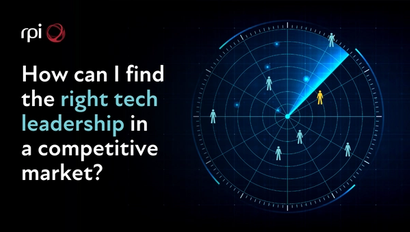Are you an interim or permanent CIO, CTO or security leader looking to develop your own fractional portfolio?
Below, I’ve rounded up all the information you need from RPI’s latest webinar for senior technology and IT leaders: How to develop a fractional portfolio career. During the webinar, we focused on the challenges and benefits of a fractional career, as well as key considerations you need to consider before taking the leap.
Joining me for the discussion were a fantastic panel of experts, including John Finch, ex-CIO of the Bank of England and now retained advisor to PE Funds; Georgina Owens, an interim CTO who was voted one of the UK’s Top 50 Most Influential Women for Tech in 2020; Dave Jones, a fractional CIO and founder of Northern IT Leaders and UK IT Leaders; and RPI’s own Daniel Manton, Search Director recruiting technology and digital leaders.
The discussion covered the dynamics of fractional careers for senior technology and C-Level individuals, what’s involved in setting up a fractional portfolio, and the benefits and challenges of managing that portfolio.
Don’t have time to watch the full discussion? Here are five key highlights below.
Consider what you want your fractional career to look like
A big discussion point for the panellists was deciding what your fractional career should look like before you leave a permanent role. Daniel Manton says there are six questions senior technology and IT leaders should be asking themselves, namely:
How strong is your network and reputation?
How will you position yourself in the market?
Are you okay with not owning the team but owning the deliverables?
What services will you offer?
Do you want to run your own business?
Where do you want to be located?
A key point of the discussion refers to work/life balance and how salary fits into it – but the participants suggest that money shouldn’t be the be-all and end-all.
“You can quite easily exceed a permanent CIO salary if you want to put the work and the hours in and you're successful at it,” says Dave. “But again, it's why are you doing it, how much do you want to actually work in this lifestyle? You could be doing it just to get by with one client and a day or two a week.
Having said this, Georgina says it's important to plan for outages: “Don’t spend the big cheque if you have nothing coming up for three months”. John adds that it’s important to have a financial plan to manage your assets, but says you can find value elsewhere in a fractional career.
“I spend a lot of time helping even more junior teams and I get a real kick out of helping them, so I see that as some of the earnings almost,” he adds.
Have a strong network in place
All the panellists agreed that to get ahead in a fractional career, it’s crucial to have built a network of contacts that can provide you with solid work early on. “I think if you don't have a strong IT network and a strong brand and purpose of what you can deliver, then you're probably not going to have a very good start to your portfolio career,” says Dave.
Georgina adds that it's important to expand your horizons with your networks and not just restrict yourself to one area. “I’m a mentor for a start-up accelerator, so I’m making lots of new connections that lead into really interesting discussions,” she adds.
Equally, John says it's important to have a broad range of connections that develops over time, and investing time into networking will be paid back in kind.
“There is no real other way to get work here,” he says. “You have to get a referral or do some really good work for someone and people learn about it or that person goes somewhere else.
Take ego out of the equation
Depending on your role, you may need to ask yourself if you are comfortable being left out of decision-making despite contributing knowledge and expertise to projects.
“You just have to accept that that's part of the role,” Georgina says. “You've given your experience and insight and that's the end of it. I think at the beginning that can feel a little bit weird.”
Indeed, John says you may just be the ‘wise old guy or girl sat in the corner’, offering support to projects but not expecting your name to appear on the presentation. “You have to be completely ego and attention-free, and just be content that you're helping other people to be really successful and effective,” he adds.
Dave mentions that he is part of decision making for some SME clients, but says it's important to make a distinction between fractional and interim roles and understand exactly what you are meant to be delivering for that client.
“Interim you're in there for three/six/twelve months, and typically you've got one client,” he explains. “With a fractional portfolio, you've got five or six clients at one time and the time is a lot more split up between them.”
Manage your time effectively to achieve the best rewards
Moving away from a traditional CIO role can be daunting without staff to fall back on. Dave Jones says the challenge of juggling time commitments means you are effectively running a startup from the word go.
“Overnight, you are a business development person, a sales and marketing person, responsible for finance etc, so you have to learn a level up pretty quickly if you're doing it yourself,” he says. “I’ve probably got six different email addresses and compound calendars to try and manage - so it's definitely a change in style.
John agrees, saying that the shift came as a ‘shock’, particularly when it came to relearning how to use Powerpoint and Excel while also conducting advisory work. Not only this, but the nature of fractional work means there is an expectation to deliver results quickly.
With time stretched, saying no has become even more important to the panellists, but it's important to do so in a way that maintains relationships. Georgina, for example, always tries to offer a referral if she doesn’t have time to complete a task, while Dave says that honesty is the best policy.
“Some people might take a role even if it's not ideal for them, especially in the interim/fractional world,” Dave says. “I think actually having the ethics to say no because it's not right for me and I can't deliver the best outcome for you, is actually a really good way to keep a strong relationship, other than potentially take it just because you're in a place where you need that work.”
SMEs are increasingly moving towards fractional talent
Dan mentions that the flexibility of fractional talent appeals to SMEs, particularly if they just need an extra pair of hands rather than somebody to come in five days a week. It could be an existing CIO/CTO who just needs help with a complex problem.
“They don't need the rest of the experience, they just need somebody who's been through it, felt the pain and knows how to kind of get them out of it,” he says.
In John’s experience, flexibility is becoming increasingly important to private equity firms that are acquiring lots of businesses. “People who’ve done any mergers and acquisitions work, worked as an interim or split a business in half - they are going to be in high demand,” he says.
The panellists also focus on the concept of mentorship as a potential driver for fractional workers. Georgina says that in her role advising boards and organisations, she gives senior tech leaders a safe place to talk about their challenges freely without judgement. “In today's [high-pressure] world, I think it's great to be able to provide that,” she adds.
Are you looking to make your next permanent, interim or contract career move, or begin constructing a fractional portfolio? RPI is at the forefront of tech-enabled transformation worldwide, delivering permanent, interim and contract solutions to sector-leading clients based in the UK, Europe, MEA, Asia, ANZ & Pacific and the Americas. To find out more, get in touch today.



